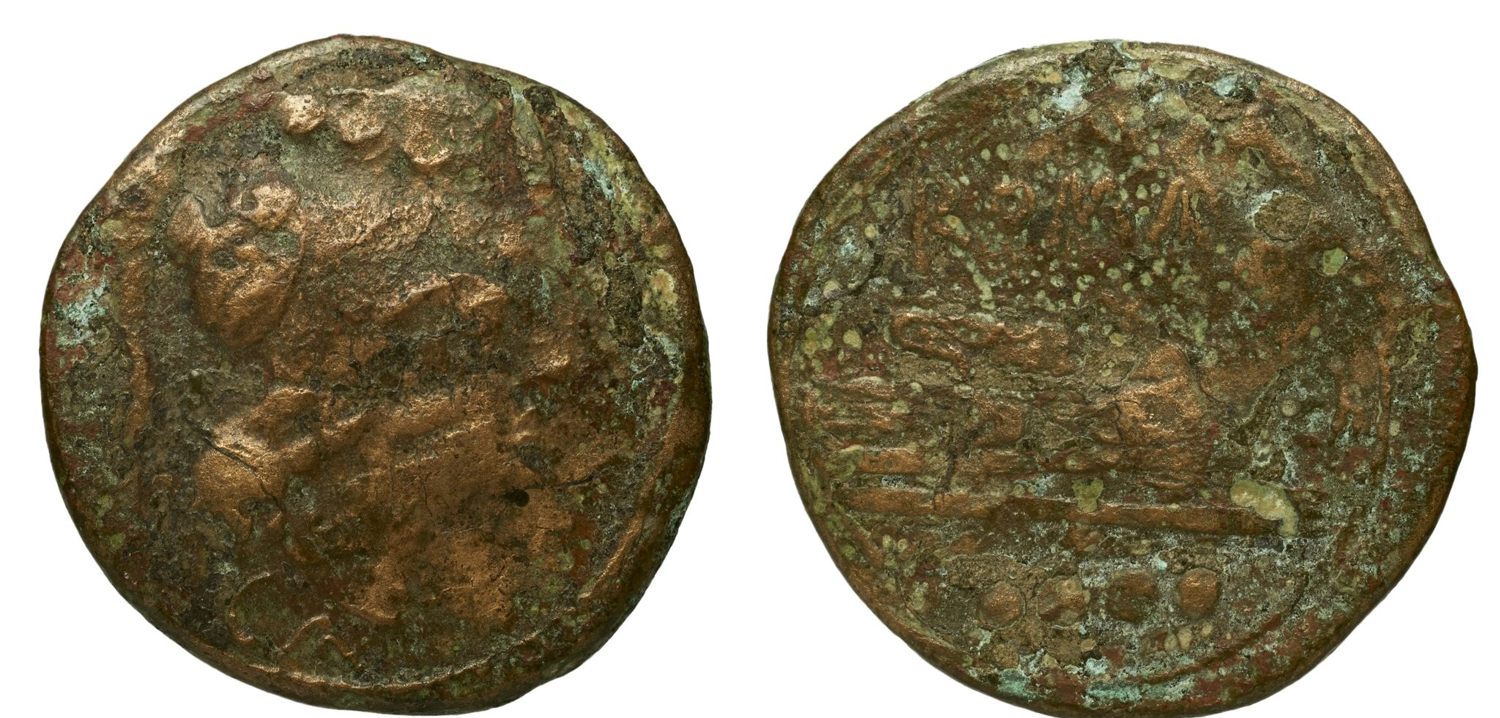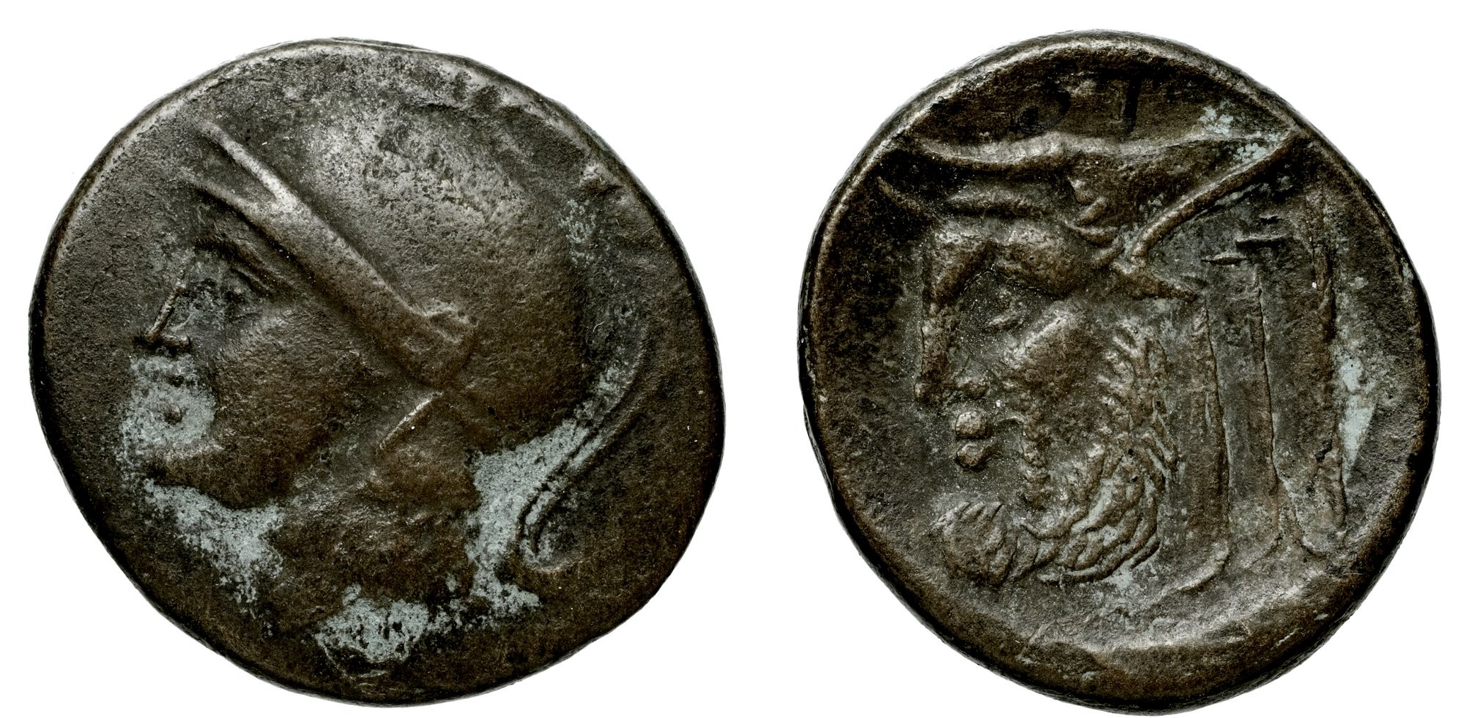1761 - Canusium (Roman Republic) (AE Minerva/prow) over Thyrrheium (Athena/Achelous) (Paris, BnF, REP 3742)
From SILVER
(Redirected from SO 1015 - Canusium over uncertain mint)
209 BCE - 208 BCE | ROMA
Location/history
| Museum collectionMuseum collection: | Paris, Bibliothèque nationale de France, REP-3742 | |
| Private collection(s)Private collection(s) ᵖ: | D'Ailly collection, 3090 |
Overstriking coin
Description
| ObverseInscription or printing placed on the obverse.: | Head of Minerva right, wearing necklace, earing and crested Corinthian helmet. Above, 4 pellets. Border of dots. | ReverseInscription or printing placed on the reverse.: | ROMA (Latin) Prow of galley right. In right field, CA. Below, 4 pellets (mark of value). Linear border. |
Mint and issuing power
| MintIdentifies the place of manufacture or issue of a numismatic object.: | Canusium | Ancient regionAncient region. | Apulia | Modern countryModern country: Italy | AuthorityIdentifies the issuing power. The authority can be "pretended" when the name or the portrait of X is on the coin but he/she was not the issuing power. It can also be "uncertain" when there is no mention of X on the coin but he/she was the issuing power according to the historical sources: | Roman Republic |
Chronology
| FromIdentifies the initial date in a range assigned in a numismatic context. 209 BCE toIdentifies the final date in a range assigned in a numismatic context.. 208 BCE | Hellenistic 323-30 BC |
Physical description
| MetalThe physical material (usually metal) from which an object is made.: Bronze |
WeightWeight of the numismatic object (in grams). in grams: 5.75.7 g <br />5,700 mg <br /> | DenominationTerm indicating the value of a numismatic object. Examples: tetradrachm, chalkous, denarius.: triens |
|
| DiameterDescribes diameter of an object (in mm).: 2222 mm <br />2.2 cm <br /> | StandardStandard.: uncial | ||
References
| Coin referenceReference of the Coin: | Hersh 1953, n° 15c | Coin series referenceReference to coin series study: | Sydenham 19521Sydenham 1952, n° 309c, Hersh 19532Hersh 1953, n° 15c, RRC3RRC, n° 100/3 |
| Coin series web referenceCoin series web references: | |||
Overstruck type
Description
| ObverseInscription or printing placed on the obverse.: | Head of Athena left, wearing Attic helmet. | ReverseInscription or printing placed on the reverse.: | Head of river-god Acheloüs left. |
Mint and issuing power
| MintIdentifies the place of manufacture or issue of a numismatic object. ᵖ: | Thyrrheium | Ancient regionAncient region. ᵖ | Acarnania | Modern countryModern country: Greece | AuthorityIdentifies the authority in whose name (explicitly or implicitly) a numismatic object was issued. ᵖ: | Acarnanian league |
Chronology
| FromIdentifies the initial date in a range assigned in a numismatic context. 250 BCE toIdentifies the final date in a range assigned in a numismatic context.. 220 BCE | Hellenistic 323-30 BC |
Physical description
References
| Coin type referenceReference to coin series study ᵖ: | BMC Thessaly4BMC Thessaly, Acarnanian League, n° 21f, BCD Akarnanien und Aetolien5BCD Akarnanien und Aetolien, n° 41-44, HGC 46HGC 4, n° 738 | ||
| Coin series web reference overstruckCoin series web references overstruck: | |||
Additional data
| Frequency of overstrikesFrequency of overstrikes: | frequent | Level of confidenceLevel of confidence of the identification: | sure |
| RemarksRemarks: | "overstruck on Acarnanian League (Athena l./river god Acheloös l.)" | ||
References
- ^ Sydenham, Edward Allen (1952), The Coinage of the Roman Republic, London, Spink & Son Ltd., lxix, 343 p., 30 pl.
- ^ Hersh, Charles A. (1953), "Overstrikes as evidence for the history of Roman Republican coinage", Numismatic Chronicle 6 (13), p. 33-68, pl. 4-5.
- ^ Crawford, Michael H. (1974), Roman Republican Coinage, Cambridge
- ^ Gardner, Percy (1883), A Catalogue of the Greek coins in the British Museum. vol. V : Thessaly to Aetolia, London, The Trustees, p. 234, pl. 32.
- ^ Münzen & Medaillen (Deutschland). Sammlung BCD : Akarnanien und Aetolien. Auction 23, 18 October 2007, Stuttgart, 591 lots.
- ^ Hoover, Oliver D. (2014), Handbook of Greek Coinage Series 4. Northern and Central Greece : Achaia Phthiotis, Ainis, Magnesia, Malis, Oita, Perrhaibia, Thessaly, Akarnania, Aitolia, Lokris, Phokis, Boiotia, Euboia, Attica, Megaris and Corinthia, sixth to first centuries BC, Lancaster, lxxi, 563 p.

